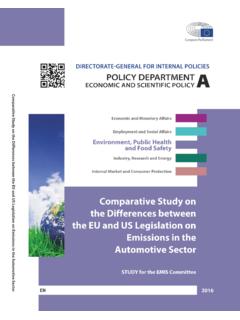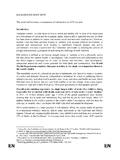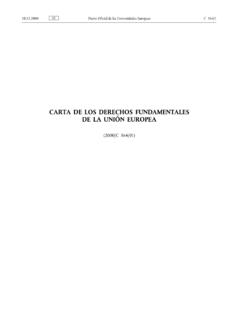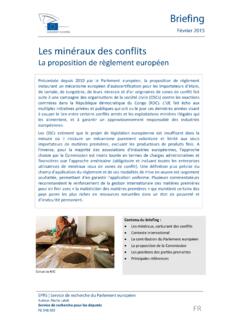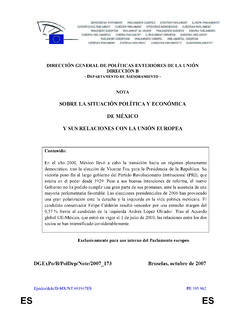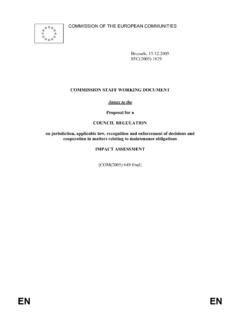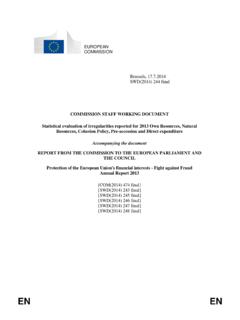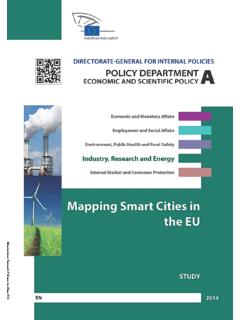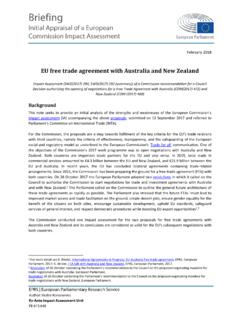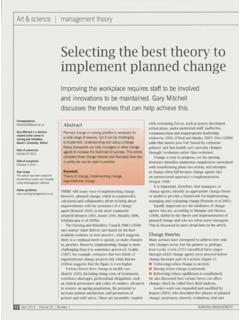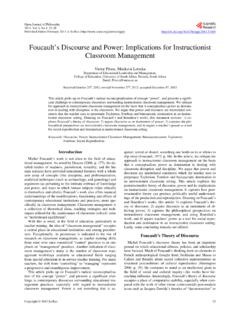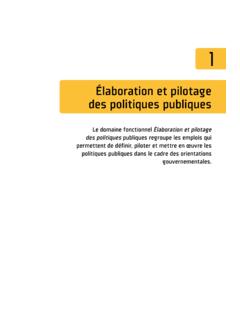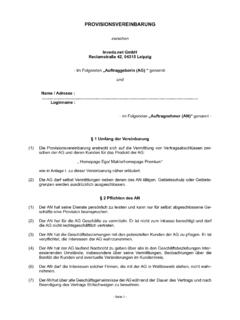Transcription of Non-financial Reporting Directive - European Parliament
1 BRIEFING Implementation Appraisal EPRS | European Parliamentary Research Service Author: Nora Hahnkamper-Vandenbulcke Ex-Post Evaluation Unit PE January 2021 EN Non-financial Reporting Directive This briefing is one in a series of implementation appraisals produced by the European Parliamentar y Research S ervice (EPRS ) on the operation of existing EU legislation in practice. Each briefing focuses on a specific EU law that is likely to be amended or reviewed, as envisaged in the European Commission's annual work programme. Implementation appraisals aim at providing a succinct overview of publicly available material on the implementation, application and effectiveness to date of specific EU law, drawing on input from EU institutions and bodies, as well as external organisations.
2 They are provide d by the E x-Post Evaluation Unit of EPRS to assist parliamentary committees in their consideration of new European Commission proposals, once tabled. SUMMARY Companies' actions have significant impacts on life in the EU and around the world, in terms of products and services, jobs and opportunities, and working conditions, human rights, health, the environment, innovation, education and training. EU citizens expect companies to u n der s t and the positive and negative impacts they have on society and the environment, and to prevent, m anage and mitigate any negative impacts, including in their global supply chains. This du ty is r eferred to as corporate social responsibility (CSR) or responsible business co n duct (RBC). Under the European Green Deal, funding economic activities that support environmental, social and governance-related objectives is key to fost ering sustainable growth, financing the green transition and unlocking the investment needed to achieve, not least, the EU's 2050 climate neutrality objective.
3 An important way to direct financial and capital flows to sustainable investment is to improve data availability and companies' and financial institutions' disclosure of Non-financial information ( information relating to the environment, social and employee-related matters, respect for human rights, and action to address corruption and bribery). This makes it easier to measure, monitor and manage companies' performance and their impact on society. The adoption of Directive 2014/95/EU on the disclosure of Non-financial and diversity information (referred to as the ' Non-financial Reporting Directive ' NFRD) set the EU on a clear course towards greater business transparency and accountability on social and environmental issues. The d i r e c tive serves as a vital instrument in terms of advancing the EU's agenda for CSR. On 11 December 2019, in its communication on the European Green Deal, the Commission announced its intention to review the NFRD as part of the strategy to strengthen the fo u nda tions for sustainable investment.
4 A public consultation, launched between February and June 2020, a nd aimed at collecting the views of stakeholders with regard to a possible revision of the NFRD, identified several shortcomings in the implementation of the NFRD, relating for instance to a lack of comparability, reliability and relevance of the Non-financial information provided. In its adjusted 2020 work programme, adopted on 27 May 2020, the European Commission indicated the first quarter of 2021 as target delivery date for the revision. EPRS | European Parliamentary Research Service 2 1. Background This briefing examines the implementation of Directive 2014/95/EU on the disclosure of Non-financial and diversity information (the ' Non-financial Reporting Directive ' NFRD)1 with a view to the upcoming European Commission proposal for its revision.
5 The Commission proposal, to be accompanied by an impact assessment, is expected in the first quarter of On 11 December 2019, in its communication on the European Green Deal (EG D),3 t he Commission identified the need for a renewed strategy on financing sustainable growth, acknowledging the key role of the private sector in financing the green transition and the need for long-term signals in order to direct financial and capital flows to green investment and avoid stranded assets. The new strategy, expected in the first half of 2021, will focus on a number of actions, including the review of the NFRD. As highlighted by the Commission, it is important that companies and financial institutions improve their disclosure of Non-financial information s o that investors are fully informed about the sustainability of their investments.
6 While the adoption of the NFRD in 2014 was a major step towards greater business transparency and accountability on social and environmental issues, users of Non-financial information, mainly investors and civil society organisations, are now demanding more and better information from companies about their social and environmental performance and impacts. Moreover, there is a global trend with a wide variety of different organisations and stakeholders calling for consideration of a new regulatory approach to Non-financial Reporting . As will be explained in this briefing, the current text of the NFRD and its implementation suffer from several deficiencies. As outlined in the inception impact ass ess ment publis hed by t he Commission in January 2020,4 there is not enough publicly available information about how Non-financial issues, and sustainability issues in particular, impact companies, and about how companies themselves impact society and the environment.
7 In addition, companies incur unnecessary and avoidable costs when it comes to Reporting Non-financial information, and face uncertainty and complexity when deciding what, where and how to report Non-financial information. For some financial sector companies, this complexity also arises from differing disclosure requirements contained in v a r ious pieces of EU legislation. Moreover, companies are under pressure to respond to additional demands for Non-financial information from sustainability rating agencies, data providers and civil society, irrespective of the information they publish as a result of the NFRD. In order to tackle these shortcomings, the planned revision of the NFRD seeks therefore to: ensure that investors have access to adequate Non-financial information from companies so as to be able to take account of sustainability-related risks, opportunities and impacts in their investment decisions; ensure that civil society organisations, trade unions and others have access to adequate Non-financial information from companies to be able to hold them to account for their impacts on society and the environment; and reduce the unnecessary burden on business relating to Non-financial Reporting .
8 In order to foster long-term sustainable and responsible corporate behaviour, as set out in the EGD, the revision of the NFRD will be complemented, inter alia, by legislation on sustainable corporate governance, to be presented by the Commission in the second quarter of 2021,5 as part of the renewed strategy on financing su s ta in able gr o wth. It should also be noted that some new pieces of EU legislation, including the R egu la t ion on sustainability-related disclosures in the financial services sector (Sustainable Finance Disclosure Regulation, SFDR),6 the Regulation establishing a framework to facilitate sustainable investment (Taxonomy Regulation)7 and the amendment to the Benchmark Regulation regarding climate-related benchmarks,8 can only fully meet their objectives if more and better Non-financial information is available from investee companies.
9 Non-financial Reporting Directive 3 The Non-financial Reporting Directive : An overview of current legislation, transposition and review clauses The Non-financial Reporting Directive ( Directive 2014/95/EU, NFRD) is an amendment to the Accounting Directive ( Directive 2013/34/EU)9 and was adopted in 2014. The disclosure of Non-financial information is considered as vital for managing change towards a sustainable global economy by combining long-term profitability with social justice and environmental protection. The objective of the NFRD is therefore to raise the transparency of the social and environmental information provided by undertakings in all sectors to a similarly high level across all Member States and thus to improve the disclosure of Non-financial information by certain large undertakings.
10 Under the NFRD, large listed companies, banks and insurance companies ('public interest entities') with more than 500 employees are required to publish reports on the policies they implement in relation to social responsibility and treatment of employees; respect for human rights; anti-corruption and bribery; and diversity on company boards (in terms of age, gender, educational and professional background). In particular, the NFRD requires companies to disclose information about their business models, policies (including implemented due diligence processes), outcomes, risks and risk management, and key performance indicators (KPIs) relevant to the business. At present, around 6 000 of the largest EU companies are required to disclose Non-financial information under the However, the NFRD leaves a fair amount of flexibility in the implementation of its provisions.
